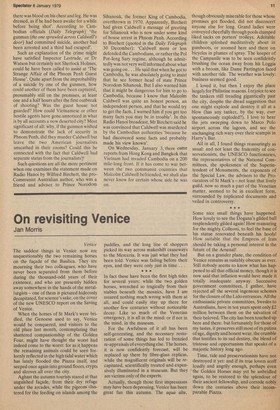On revisiting Venice
Jan Morris
Venice The saddest things in Venice now are unquestionably the two remaining horses on the facade of the Basilica. They are mourning their two colleagues, who have never been separated from them before during the thousand-odd years of their existence, and who are presently hidden away somewhere in the hands of the metallurgists — one of them is pictured hideously decapitated, for science's sake, on the cover of the new UNESCO report on the Saving of Venice.
When the horses of St Mark's were bridled, the Genoese used to say, Venice would be conquered, and visitors to the old place last month, contemplating that shattered companionship of the Golden Four, might have thought the worst had indeed come to the worst: for as it happens the remaining animals could be seen forlornly reflected in the high tidal water which has lately flooded the Piazza itself, and seeped once again into ground floors, crypts and alcoves all over the city.
Aghast the autumn tourists stared at that anguished façade, from their dry refuge under the arcades, while the pigeons clustered for the feeding on islands among the puddles, and the long line of shoppers picked its way across makeshift causeways to the Merceria. It was just what they had been told. Venice was failing before their eyes, and they were only just in time . . .
In fact these have been the first high tides for several years: while the two golden horses, wrenched so tragically from their stables beneath the mosaics, have I am assured nothing much wrong with them at all, and could easily stay up there for another few centuries without noticeable decay. Like so much of the Venetian emergency, it is all in the mind: or if not in the mind, in the museum.
For the Awfulness of it all has been self-generating, and the necessary restoration of some things has led to frenzied re-appraisals of everything else. The horses, it is now confidently forecast, will be replaced up there by fibre-glass replicas, while the magnificent originals will be recapitated, scientifically treated and expensively illuminated in a museum. But they are victims only of the experts.
Actually, though those first impressions may have been depressing, Venice has been great fun this autumn. The aqua alta, though obviously miserable for those whose premises got flooded, did not disconcert anyone else for long. Grand ladies were conveyed cheerfully through pools clumped liked sacks on porters' trolleys. Adotable children sploshed meditatively about in gumboots, or zoomed here and there on bicycles in plumes of spray. The keeper of the Campanile was to be seen confidently brushing the ocean away from his Loggia with a broom, like Dame Partington faced with another tide. The weather was lovely: business seemed good..
I loved it, but then I enjoy the place largely for Philistine reasons. I rejoice to see the tankers still treading gigantically past the city, despite the dread suggestion that one might explode and destroy it all at a blow (has any tanker, by the way, ever spontaneously exploded?). I love to hear the jets sweeping down to Marco Polo airport across the lagoon, and see the unchanging rich wary over their scampis in Harry's Bar.
All in all, I found things reassuringly as usual: and not least the fraternity of conservationists, the UNESCO functionaries, the representatives of the National Committees, the spokesmen of the Superintendent of Monuments, the exponents of the Special Law, the advisers to the Procurators of St Mark's — not least that lively guild, now so much a part of the Venetian matter, seemed to be in excellent form, surrounded by triplicated documents and veiled in controversy.
Some nice small things have happened. How lovely to see the Dogana's gilded ball resplendently gilded again! How reassuring for the mighty Colleoni, to feel the base of his statue renovated beneath his hoofs!
How suitable that the Empress of Iran should be taking a personal interest in the future of the Arsenal!
But on a grander plane, the condition of Venice remains as suitably obscure as ever. Still nobody seems to know what has happened to all that official money, though it is now said that inflation would have made it totally inadequate anyway. Successive government committees, I gather, have rejected all the several ingenious schemes for the closure of the Lido entrances. All the enthusiastic private committees, Swedes to Australians, have in ten years spent only £2 million between them on the salvation of their beloved. The city has been touched up here and there: but fortunately for those of my tastes, it preserves still most of its patina of age, dignity and honest wear, the crumble that testifies to its sad destiny, the blend of tristesse and opportunism that speaks of a majestic history long ago.
Time, tide and preservationists have not destroyed it yet: and if its true lovers scoff loudly and angrily enough, perhaps even 'the Golden Horses may yet be unbridled again, to be restored to the splendour of their ancient fellowship, and corrode nobly down the centuries above their incomparable Piazza.






























 Previous page
Previous page